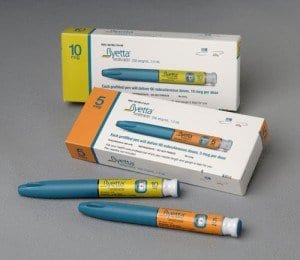 Amylin Pharamceuticals, Inc. recently won a significant victory as its Type 2 diabetes medication Byetta won expanded approval for use in conjunction with the best-selling insulin throughout the world.
Amylin Pharamceuticals, Inc. recently won a significant victory as its Type 2 diabetes medication Byetta won expanded approval for use in conjunction with the best-selling insulin throughout the world.
The Food and Drug Administration first approved Byetta, an injectable medication, in 2005. Developed by Amylin Pharmaceuticals and Eli Lilly & Co., Byetta is now cleared for use with insulin glargine, marketed as Lantus by the French pharmaceutical manufacturer Sanofi. Insulin glargine is a long-lasting type of insulin that releases slowly into the bloodstream, similar to insulin release by pancreatic beta cells in individuals without diabetes. One dose of insulin glargine lasts 18 to 26 hours, allowing for a once-daily dose in most diabetics.
Byetta (exenatide) is injected under the skin of the arm, thigh, or abdomen, 60 minutes before either the first or last meal of the day. The drug works by stimulating pancreas cells into ramping up insulin production when blood glucose levels are elevated; it has been approved both as a standalone medication along with diet and exercise and for use in conjunction with other diabetes medications. Byetta has a wide range of benefits for diabetes users. In addition to increasing insulin production, it also suppresses the release of glucagon by the pancreas, which prevents blood glucose levels from rising to dangerous levels; it slows gastric emptying, which slows down the introduction of glucose into the bloodstream after a meal; it reduces the fat content of the liver; and it reduces appetite, promoting weight loss over the long-term, especially in obese individuals, which helps mitigate the risk of complciations associated with Type 2 diabetes.
According to Vincent Mihalik, senior vice president of sales and marketing at Amylin, the FDA’s expanded approval of Byetta will drastically increase its usage, making it “available to millions of insulin-using Type 2 diabetes patients in the United States.”
Of the 26 million people over the age of 20 in the United States with diabetes, about 90 percent are afflicted with Type 2 diabetes, says the American Diabetes Association. Individuals with Type 2 diabetes either lack insulin or their cells don’t respond to insulin, which is normally responsible for lowering blood glucose levels, especially after a meal. The lack of insulin naturally produced by the beta cells of the pancreas means that most Type 2 diabetics need at least one shot of insulin every day.
According to John Buse, director at the Diabetes Care Center and head of the Division of Endocrinology at the University of North Carolina’s School of Medicine, the expanded approval of Byetta will offer new treatment possibilities for patients who are unable to control their diabetes. “This expanded use for Byetta is important for clinical care, in that it provides a new option for the many patients with Type 2 diabetes who are not achieving treatment goals,” said Buse.
Amylin Pharmaceuticals released a statement in May, noting that the company was alleging anti-competitive activity and a breach of a strategic alliance agreement against Eli Lilly & Co. Though Byetta was developed jointly by Amylin and Lilly, Amylin is attempting to prevent Lilly from using the same sales force in promoting Lilly’s other product—linagliptin, marketed as Tradjenta. Lilly is developing linagliptin, as well as a longer-lasting version called Bydureon, in conjunction Boehringer Ingelheim GmbH, a German pharmaceuticals company that is one of the top 20 in the world, with over 42,000 employees globally. The FDA approved Linagliptin for sale in the United States in May.